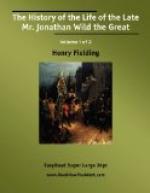But to proceed with our history, which will, we hope, produce much better lessons, and more instructive, than any we can preach: Wild was no sooner retired to a night-cellar than he began to reflect on the sweets he had that day enjoyed from the labours of others, viz., first, from Mr. Bagshot, who had for his use robbed the count; and, secondly, from the gentleman, who, for the same good purpose, had picked the pocket of Bagshot. He then proceeded to reason thus with himself: “The art of policy is the art of multiplication, the degrees of greatness being constituted by those two little words more or less. Mankind are first properly to be considered under two grand divisions, those that use their own hands, and those who employ the hands of others. The former are the base and rabble; the latter, the genteel part of the creation. The mercantile part of the world, therefore, wisely use of the term employing hands, and justly prefer each other as they employ more or fewer; for thus one merchant says he is greater than another because he employs more hands. And now indeed the merchant should seem to challenge some character of greatness, did we not necessarily come to a second division, viz., of those who employ hands for the use of the community in which they live, and of those who employ hands merely for their own use, without any regard to the benefit of society. Of the former sort are the yeoman, the manufacturer, the merchant, and perhaps the gentleman. The first of these being to manure and cultivate his native soil, and to employ hands to produce the fruits of the earth. The second being to improve them by employing hands likewise, and to produce from them those useful commodities




